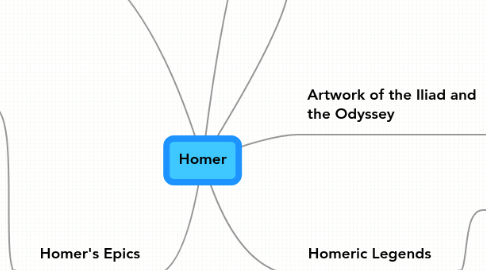
1. Homer's Epics
1.1. The Iliad
1.1.1. The tragic story of the tenth year of the Trojan War in poetic form with Achilles as the main hero, though the character of Hector was also important
1.1.2. A story that is simply styled because everything is in chronological order
1.1.3. A story full of quarreling among everyone - even the gods.
1.1.4. Achilles
1.1.4.1. The hero of the story
1.1.4.2. Highly idealized in Greek culture
1.1.4.3. A person who still made human mistakes although he was viewed as god-like
1.1.4.4. Fought for himself and his own glory
1.1.5. Hector
1.1.5.1. Leader of the Trojan Army
1.1.5.2. The man who is eventually killed by Achilles
1.1.5.3. Fought for his country, instead of for himself
1.2. The Odyssey
1.2.1. The story of Odysseus's long journey home from Troy after fighting the Trojan war
1.2.2. A story that is much more complicated than the Iliad, going back in time (for example, Odysseus telling of his adventures)
1.2.3. It shows how one's fate is predetermined, and there is really nothing a mortal can do to change his/her fate.
1.2.4. Odysseus (king of Ithaca)
1.2.4.1. An incredibly smart and witty man
1.2.4.2. Survives through intelligence, not just strength and force
1.2.4.3. A man who loves romance, as shown by his many relationships with women such as Calypso, Circe, Nausicaa, and most importantly Penelope.
2. Homeric Hymns
2.1. Hymns addressed to the many different gods for the purpose of celebrating their specific attributes and worshiping them
2.2. Composed between 800 and 300 B.C.
2.3. In the format of the Dactylic Hexameter
2.4. Homer most likely did not write these hymns; instead they were anonymous poems.
2.5. A huge religious resource for the Greek people
3. Bibliography
4. The Homeric Question
4.1. The Argument
4.1.1. Who composed the Iliad and the Odyssey?
4.1.1.1. A single author made up the stories and composed them.
4.1.1.2. A single author gathered many different stories and put them together. It is possible that he wrote them at different times in his life (explaining the different styles and languages).
4.1.1.3. Multiple authors produced the Iliad and the Odyssey.
4.1.1.4. The Iliad and the Odyssey were written by two different authors
4.1.1.5. A woman author composed the Odyssey
4.1.1.5.1. Samuel Butler, a man who researched the classics, proposed the theory that a woman might have composed the Odyssey in his book The Authoress of the Odyssey (19th century).
4.1.1.5.2. The Odyssey is mainly about women, except for Odysseus and Telemachus.
4.1.1.5.3. The description of women's actions and thoughts in the Odyssey are extremely descriptive - unlike those in the Iliad.
4.2. The length
4.2.1. People wonder how Homer could have composed, memorized, and written the long epics.
4.3. The style
4.3.1. Dactylic Hexameter style
4.3.1.1. The Iliad
4.3.1.1.1. A tragic story
4.3.1.1.2. The book of Homer's youth
4.3.1.1.3. The Iliad has an enormous amount epic similes (a few per page) in order to make the story of a war relate to every day life.
4.3.1.2. The Odyssey
4.3.1.2.1. A heroic, somewhat comical story
4.3.1.2.2. The book of Homer's maturity
4.3.1.2.3. The Odyssey tells one man's story, and does not have as many similes as the Iliad because the story itself relates to life, and not war.
5. Artwork of the Iliad and the Odyssey
5.1. The art was depicted much later than the books were written.
5.2. The same scenes are depicted differently by different artists.
6. Homeric Legends
6.1. Homer was a blind poet/singer/storyteller (bard).
6.1.1. Comes from a reference to a bard in the Odyssey named Demodecus
6.1.2. The Greeks really have no other information about him.
